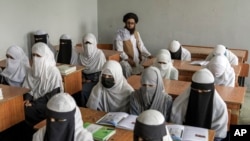The Taliban’s decision this year to deprive girls of an education is costing Afghanistan 2.5% of its gross domestic product, according to UNICEF, the United Nations children’s fund.
In addition, the agency said its analysis “indicates that Afghanistan will be unable to regain the gross domestic product lost during the transition and reach its true potential productivity without fulfilling girls’ rights to access and complete secondary school education.”
UNICEF said Monday, “If the current cohort of three million girls were able to complete their secondary education and participate in the job market, girls and women would contribute at least $5.4 billion to Afghanistan’s economy.”
UNICEF said its account does not factor in the non-financial impacts of denying girls access to education, which include the resulting shortages of female teachers, doctors and nurses. That, UNICEF said, will lead to decreasing attendance of girls in primary school and increasing health costs related to adolescent pregnancy.
The Taliban’s decision was “shocking and deeply disappointing,” UNICEF Afghanistan Representative Dr. Mohamed Ayoya said in a statement. It violated girls’ fundamental right to an education, he added, and it “exposes them to heightened anxiety, and greater risk of exploitation and abuse, including child trafficking, early and forced marriages.”





